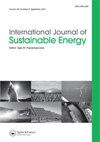2050年韩国住宅建筑行业实现气候中和的脱碳情景
IF 2.7
Q4 ENERGY & FUELS
引用次数: 2
摘要
摘要建筑行业的脱碳战略占全国温室气体排放量的24%,对于到2050年在韩国实现气候中和至关重要。在这项研究中,开发了一个自下而上的模型和四种情景,用于检查到2050年住宅建筑脱碳的情景。对能源消耗、温室气体排放和投资成本进行了比较分析。结果表明,提高建筑能源性能和供暖燃料电气化是脱碳的关键措施。我们得出的结论是,要实现2050年的脱碳情景,每年需要6.2万亿韩元的投资。提出了增加投资以加快建筑改造、强制实施零能源建筑和禁止燃气锅炉的政策策略。本文章由计算机程序翻译,如有差异,请以英文原文为准。
Decarbonization scenarios for residential building sector in South Korea toward climate neutrality in 2050
ABSTRACT The decarbonisation strategy of the building sector, which accounts for 24% of national greenhouse gas (GHG) emissions, is important to achieve climate neutrality in Korea by 2050. In this study, a bottom-up model and four scenarios were developed for examining scenarios for the decarbonisation of the residential building by 2050. A comparative analysis of energy consumption, GHG emissions, and investment cost was performed. The result showed that building energy performance improvement and heating fuel electrification are key measures for decarbonisation. We concluded that an investment of KRW 6.2 trillion per year would be required to achieve the 2050 decarbonisation scenario. Policy strategies were proposed for increasing investment in accelerating building retrofit, mandating zero-energy building (ZEB), and prohibiting gas boilers.
求助全文
通过发布文献求助,成功后即可免费获取论文全文。
去求助
来源期刊

International Journal of Sustainable Energy
ENERGY & FUELS-
CiteScore
5.70
自引率
3.20%
发文量
52
期刊介绍:
Engineering and sustainable development are intrinsically linked. All capital plant and every consumable product depends on an engineering input through design, manufacture and operation, if not for the product itself then for the equipment required to process and transport the raw materials and the final product. Many aspects of sustainable development depend directly on appropriate and timely actions by engineers. Engineering is an extended process of analysis, synthesis, evaluation and execution and, therefore, it is argued that engineers must be involved from the outset of any proposal to develop sustainable solutions. Engineering embraces many disciplines and truly sustainable solutions are usually inter-disciplinary in nature.
 求助内容:
求助内容: 应助结果提醒方式:
应助结果提醒方式:


